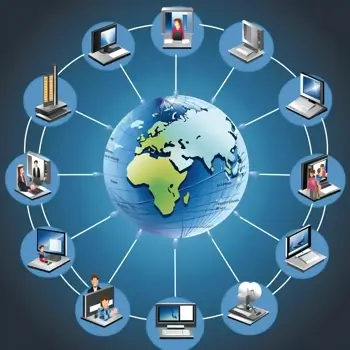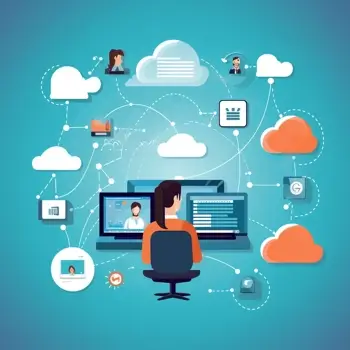What Is an ISP (Internet Service Provider)?
The Internet is used in almost every aspect of life. Therefore, reliable access to the Internet is essential. Though we may take it for granted, Internet access ultimately all relies on your Internet service provider, or ISP. But who is my ISP - and what is my ISP in the first place? In this article, we'll cover what an ISP is, how they work, the services they provide, and explain how you can find who your ISP is.
What is ISP?
An ISP, meaning Internet service provider, is a company that provides their customers with access to the Internet, allowing them to browse online, visit websites, and communicate with others. ISPs provide Internet services for both personal and commercial use. Though most people get a router from their ISP to access the Internet, ISPs supply more than just Internet. They offer several other methods of Internet connection as well as additional services in some cases.

What services do ISPs provide?
Internet service providers primarily provide access to the Internet. However, some do have more services available in conjunction with Internet access. You may find that your Internet service provider also offers:
- email services
- web hosting capabilities
- development services
- domain registration
- television or cable access
- cellphone or telephone service
Almost all ISPs offer the ability to access the web and use email. But many Internet service providers offer bundles of the above services depending on your needs. Internet service providers also keep logs of your activity; this doesn't need to be a privacy concern for users who are not committing nefarious acts online. A VPN can encrypt this data so your ISP can't spy on you.
In most cases, Internet service providers also provide IP location data to ARIN (American Registry for Internet Numbers). ARIN administers and keeps track of IP addresses and ASNs.
How ISPs work
Internet service providers function in network systems. The Internet itself is ultimately just a series of networks. When you connect to your Internet service provider's network via their services, they assign each device an IP (Internet Protocol) address and then connect you to a larger network. This continues until you access the Internet through a wide area network (WAN).
How many networks or connections your Internet connection goes through depends on what tier your Internet service provider is on.
How your ISP works will depend on the type of connection you have through your ISP. It can be based on analog lines, DSL, WiFi, cable, or several other types of connections, with the underlying infrastructure being different for each. It also depends on whether or not your ISP is restricted by net neutrality. Regardless of the connection method your ISP provides, the service travels through networks in seconds - quick enough that we don't even realize the several connections that need to occur in order for us to communicate with the Internet.
Understanding the ISP tier system
As mentioned above, Internet service providers are ranked in tiers. These tiers refer to the levels of access that ISPs have to the Internet directly. They break down into three categories: Tier 1, Tier 2, and Tier 3.
Tier 1 Internet service providers

Tier 1 Internet service providers have almost complete and direct access to Internet networks. They are able to easily exchange with other network providers and often have near-total control of a certain area's market due to their access and agreements with comparable providers. They invest heavily in their technology and frameworks in order to maintain access.
Some examples of Tier 1 ISPs are AT&T, LG, Samsung, Verizon Fios, and CenturyLink. These ISPs are able to share access with each other without paying fees for traffic exchange, which is referred to as public peering.
Tier 2 Internet service providers
Tier 2 Internet service providers, in many cases, must pay for access to several different vendors or transit services from Tier 1 providers. Transit means an ISP allows traffic to cross through its network in order to reach a final destination, typically for a fee; essentially, one tier is utilizing the services of another, higher tier.
Tier 2 providers can share access with each other without fees, like Tier 1 providers can with one another, but Tier 2 ISPs cannot get direct and total access to all networks independently. They do, however, have extensive peering networks with other Tier 2 ISPs that allow them to handle traffic on a regional level efficiently.
Tier 3 Internet service providers
Similarly, Tier 3 Internet service providers need to purchase access and services from above tiers. They have the least control over their own access, since they must rely on Tier 2 and Tier 1 providers to get the same level. Though this does not mean Tier 3 ISPs are poor quality, it increases the risk of convoluted network connections.
Types of Internet connections ISPs provide
Internet service providers offer a variety of different Internet connection methods depending on users' needs. Depending on where you live, your Internet usage, your browsing habits, and your online activities, you may find a certain Internet connection type works better for you. Consider the following Internet connection types and the kinds of activities they are generally suited for when you choose an ISP and Internet plan.
Cable

Cable Internet is what many people picture when they think of types of Internet services and access. This type of Internet uses a cable modem plugged directly into the Internet via coaxial cables in your home. It provides average Internet speeds. They aren't the fastest on the market, but it's a reliable pace for those who use the Internet regularly for a myriad of activities.
Fixed wireless broadband
Fixed wireless broadband Internet allows users to access the Internet from a stationary antenna. These Internet plans work well in rural areas with no wired broadband infrastructure. It is a solid option for people with a moderate amount of Internet traffic.
Digital subscriber line (DSL)
Digital subscriber line (DSL) allows for faster Internet access than dial-up connections by using local phone lines. It isn't the fastest form of Internet, but it still works for users who browse the Internet or stream videos. It's a solid choice for users who frequently game online due to its reliability and low latency.
Dial-up
Dial-up is one of the oldest Internet options. Though outdated, it does still exist. Dial-up is best used if you only use the Internet casually to check email or news updates. For heavy Internet users, dial-up Internet lacks the necessary speeds.
Fiber optic
Fiber-optic Internet uses light to transmit information across optical fiber cables, making it one of the faster forms of Internet. Though it isn't as widely available in all areas yet, fiber-optic is a good choice for users who want to use the Internet, stream, game, video chat, and more at the fastest available upload and download speeds.
Satellite
Satellite is another form of wireless Internet used often in rural areas. Though it relies on signals from space to properly function, satellite provide fast speeds when a clear connection is established.
How do I find my ISP?
If you aren't overly familiar with how your Internet works, you may not know who your Internet service provider is or how to find them. If you're wondering what is my IP address, you can check the WhatIsMyIP home page. Similarly, if you want to know "who is my Internet service provider?" you'll also find your Internet service provider on the home page. It also shows your IP location and your IP address - both your IPv4 and IPv6 address if available.
You can also find someone else's ISP if you have their IP address. Enter the IP into the IP Lookup Tool. You'll receive information about the IP address' Internet service provider, time zone, and general location.
Whether you're looking up your IP address or someone else's, you may find that the IP geolocation data is incorrect. This happens; IP location data isn't always completely accurate. Changing your IP address with a VPN or proxy will also make your data appear incorrect. You can update your IP geolocation data with third-party databases if you want to correct the error.
Frequently asked questions
What is my Internet service provider?
Your Internet service provider is the company that provides you with Internet access, which lets you browse online, visit websites, and communicate with others.
Is ISP the same as WiFi?
No, an ISP is not the same as WiFi. Though Internet is often colloquially thought of as WiFi, they are separate things. Internet service providers can offer WiFi, but they supply Internet via numerous ways - not just through WiFi.
Internet service providers supply Internet to a location. WiFi providers take that Internet and route it through to users. It's possible to have a WiFi connection and still no Internet if your Internet provider is experiencing outages. It's also possible to have available Internet that you can't access if your WiFi connection is out or not strong enough.
What are the types of ISP?
There are several different types of ISP that provide different types of WiFi. ISPs can be either Tier 1, Tier 2, or Tier 3. They provide cable Internet, fixed wireless Internet, DSL Internet, dial-up Internet, fiber-optic Internet, and satellite Internet.
What does ISP stand for?
ISP stands for Internet service provider. Internet service providers (ISPs) do exactly what the name indicates: offer Internet services to users via network connections. Most residential services provided by ISPs use dynamic IP addresses. However, ISPs usually offer the option to upgrade to a static IP address for a small fee.
Can I change my IP address through my ISP?
Yes, you can change your IP address by contacting your Internet service provider. Changing your IP address can give you more anonymity online; though your ISP will have a record of your IP address changes, it's possible for your ISP to change your IP address. However, you can also easily change your IP address with a VPN or proxy.